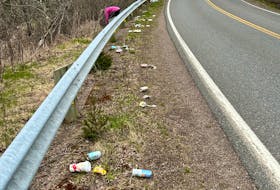It’s a trend in Nova Scotia where citizens and non-profit groups are looking to the courts to rule on government decisions. The latest involves an appeal giving two environmental groups standing in a decision involving the proposed LNG project in Goldboro, Nova Scotia. Ecojustice lawyer James Gunvaldsen Klaassen explains why the legal charity is involved in cases like this. And he tells us why this is important for democracy.
Transcript
Sheldon MacLeod: This was a story that we had published back in August of last year, Environmental Groups call for a Federal Assessment of a Proposed Goldboro LNG (liquefied natural gas) facility. Part of that process involved a realignment of a highway in order to make it happen. And that became a subject of an appeal for standing to speak to this issue by the ecology Action Center in Nova Scotia and New Brunswick Anti-shale Alliance. And initially, the lower court said no,. And on the 22nd of February, that was overturned. What does this all mean? Well, that's why we wanted to speak with James Gunvaldsen Klaassen with Ecojustice. And for those of you don't know, Ecojustice is an environmental law charity. And James is lawyer with this group. And thank you very much for speaking with me today. I appreciate it.
James Gunvaldsen Klaassen: Thanks for having me on the show, Sheldon.
SM: What can you tell me the opposition to a liquefied natural gas project in Goldboro, Nova Scotia that Ecojustice has said they're not in favor of?
JGK: Well, the big concerns that our clients had about this project were firstly, that the highway itself enables the larger Goldboro LNG project, which if it becomes a reality will be one of the biggest if not the biggest greenhouse gas emitter in Nova Scotia, it will completely destroy any possibility of meeting climate targets that Nova Scotia has been quite good at in historically been done quite well. But this project would basically destroy any chance of meeting those targets and will be a major contributor to climate change. The other issue that our clients had was regarding the site, and it's built over, you know, a site that was once where there were many gold mines that were there historically. And by digging up the site to be to build a highway, you disturb all those old mine tailings that are full of toxic chemicals that could then be released into the environment. So, it's a major concern, and something that, frankly, was not on the Minister's radar. And that was a, our clients were trying to raise that issue the profile of those issues,
SM: This appeal says that lower court was wrong to rule these two groups should not have standing in the process to evaluate or legally challenge whether this should go forward. What was the argument presented that overturned this?
JGK: The main issue in the court and as argued by the province, about our client’s participation was that these issues that we were raising were not serious. And certainly, it's difficult to accept that climate change is not a serious issue. And certainly, the Court of Appeal, and to their credit that the court below also noted that that issue was important. However, they didn't consider our clients to have a right to bring those issues. The Court of Appeal didn't accept that and found that our clients indeed had properly raised the issue and should be litigated and determined on its merits in the court. And our clients were attempting to argue this by way of what we call public interest standing, which gives the ability for groups that may not be directly affected by an issue or environmental problem to still raise it on behalf of in the public interest. And so, there's a test for that. And one of the components of the test is that the issue has to be serious. And so happily, we demonstrated to the Court of Appeal that this indeed was serious, and certainly our clients consider these to be very serious issues.
SM: This is a trend that I've noticed in fact, I spoke with someone earlier this week who is taking the province’s Information Commissioner to court to argue that they're letting Freedom of Information requests go unanswered for extended periods. Citizen groups have taken the provincial government to court over environmental issues for (not) protecting wildlife. Why is this important? Why should private or nonprofit charities and groups or even citizens go to the legal process to stop government process?
JGK: Well, I mean, it's important because we live in a democracy and governments have to be accountable to the people that they are there to serve. And governments have to be held to a high standard under the law just as everyone else must be. But if a decision or an action by government can't be challenged in court, then it's essentially immunized. And it can act illegally with no consequence. And so, our public interest standing and groups like our clients, and many others, from all political stripes, from all sorts of perspectives, rely on public interest standing to raise important issues and have them determined. To make sure that whatever happened was done lawfully and in an accountable fashion. And so public understanding is a major useful mechanism for that. And of course, we want the governments to be accountable for their actions. We want them to demonstrate that what they did, complied fully with the law and that when they don't, there has to be consequences, legal consequences for that. And so public interest standing is extremely valuable to groups to be able to raise those issues,
SM: There was the situation involving proposal for a golf course that included a an area that had been suggested as or designated as a provincial park at one point. And the ruling from a judge was, that's a ballot box issue. It's not necessarily a legal issue. Can you talk me through how that influences or impacts the work that groups like yours are doing to try and hold governments to account and to be mindful of the legal ramifications of those decisions?
JGK: Well, we were involved in that case regarding Owl's Head to some degree. We intervened in the appeal on that case, but certainly we weren't involved in the in the in the commencement of the original proceeding. Definitely the government was not forthright, was not accountable, was not acting transparently. And that matter was taken to court using public interest standing and that is the key. It has to be a right of citizens to be able to do that in appropriate cases. It's not that anyone can bring anything at any time, you have to demonstrate that you have an interest, and that it's the best way to bring it to court. But when those conditions are met, and when the issue is serious, it's vital that this is available to groups of from whatever perspective they bring to the court.
SM: I wouldn't be surprised that very few people have heard about this appeal court decision involving ecology Action Center in the New Brunswick Anti-shale Alliance. And in the news release sent by Ecojustice, said that environmental groups are celebrating this decision. Why is this worthy of celebration?
JGK: Well, it's worthy because it provides access to justice, as I've been saying. I mean, environmental problems can be insidious. They can be slow to manifest themselves. And often, individuals, citizens don't have the resources or aren't connected enough to the problem to be able to raise this themselves. And so environmental groups often have to do this, and they have the resources. And they are able to bring this to the court in a way that an individual can't. And I think it serves the public to have these things brought before the court in an effective way and have it determined and so we all are clear as to how governments must act and what is lawful and what is not.
SM: There are people who say and governments will argue this is about economic development to help pay for all of the things that we so desperately rely upon, including the challenges with the healthcare system. How do you bring public opinion to your side when there's that other argument that this will be good for our economy and for our province.
JGK: But I think it's a false polarity to say either we must do things to further the economy or to fight climate change. I think we can do both, and we have to do both. There's going to be much of an economy when our world is heating too high, and we can't function the way we used to do. I think it's much better to take these things into account. And in this case, we were in the context of an environmental assessment and that is indeed where you must take all the impacts of the project into account, and then plan for it and make sure these are mitigated. And then, in appropriate cases, developments do go forward. And they do give sustainable jobs if they're done, planned haphazardly, or don't factor in all the problems that they can create, it's ultimately going to be a disaster both for the project and for the public and for the environment. So environmental assessment has to be used as it should be used. And here, obviously, the nuts and bolts of the argument is that it was not done and we look forward to being able to argue that before the court in due course,
SM: This was a small step towards that next step, which is?
JGK: It will be before the Supreme Court in Nova Scotia to decide whether in fact the minister acted illegally when approving this project. And we look forward to making those arguments as I’ve said.
SM: Anything else that we should add James,
JGK: Just thank you very much for your interest in the case and we'll keep you posted.
SM: James Gunvaldsen Klaassen, lawyer with Ecojustice in Halifax an environmental law charity. Thanks again.








